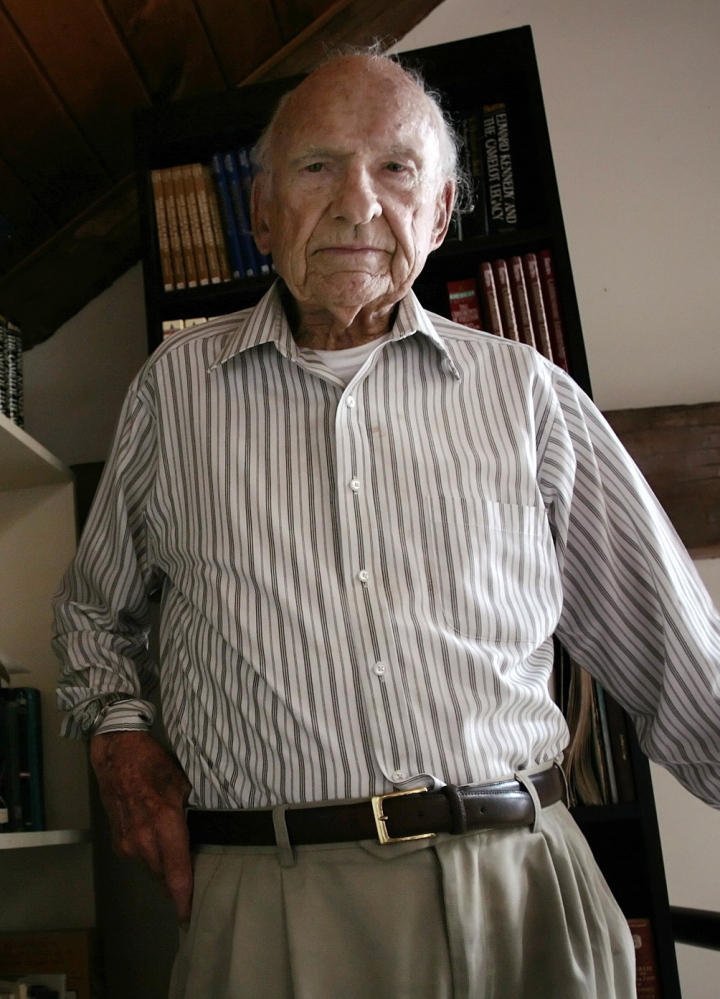James MacGregor Burns, one of the country’s pre-eminent political historians, who won the Pulitzer Prize for his 1970 study of Franklin D. Roosevelt and was instrumental in developing the interdisciplinary field of leadership studies, died July 15 at his home in Williamstown, Massachusetts. He was 95.
His death was confirmed by his son Stewart Burns, who said he could not cite a specific cause.
James MacGregor Burns, who had been affiliated with Williams College in Williamstown since the 1930s, published more than 20 books, including a two-volume biography of Roosevelt and a three-volume political history of the United States called “The American Experiment.” He was the co-author of “Government by the People,” which was a standard political science textbook for more than 50 years, since it was first published in 1952.
“He is absolutely in the first rank,” presidential historian Michael Beschloss, a former student of Burns, said Tuesday. “When he wrote a book, his ambition was almost never simply to produce excellent scholarship, but also to have an impact on society.”
Early in his career, Burns began to make the study of leadership a hallmark of his scholarship. He deftly wove together various intellectual disciplines, including political science (his nominal specialty), history, psychology and philosophy in his 1978 book, “Leadership,” which is considered a classic historical analysis.
To a large extent, Burns created a new academic field focused on the exercise of leadership. In the early 1990s, he was based at the University of Maryland, where the university’s Academy of Leadership bears his name.
“He decided that to really study leadership, you had to go across the old academic divisions between disciplines,” Beschloss said. “The result was that the book, as it was finally published, was very cross-disciplinary, which was unusual for that time.”
Looking at power as a ‘relationship’
Burns showed how a leader’s personality can have a powerful influence on historical events and public opinion. He distinguished between “transforming” leaders, who motivate the public through an appeal to conscience and morality, and “transactional” leaders, who move incrementally, through political give-and-take.
“What is missing is an awareness that power is not merely a thing, but a relationship,” Burns wrote in a 1978 essay. “Truly great and creative leaders do something more. They arouse peoples’ hopes and aspirations and expectations, convert social needs into political demands, and rise to higher levels of leadership as they respond to those demands.”
He clearly was more impressed by transformative leaders, such as Franklin Roosevelt, who was the subject of Burns’ best-known biographical studies, “The Lion and the Fox” (1956) and “The Soldier of Freedom” (1970). The latter book won the Pulitzer Prize, National Book Award and Francis Parkman Prize for history.
Burns argued that Roosevelt was both a calculating political operative and, on another level, a visionary who uplifted the hopes of the people.
” ‘The Lion and the Fox’ was such an important book,” Geoffrey Ward, another Roosevelt biographer, told the Associated Press in 2007. “It pointed the way to the notion that Roosevelt was a very complicated guy, a master tactician. He was not the saintly figure that some of his admirers had thought and not the villain his enemies thought he was, but an extraordinary political realist. Burns gave people permission to look at Roosevelt as a whole person.”
In other works, Burns seemed prescient in his understanding of the pitfalls lurking within the U.S. political system.
In his 1963 book, “The Deadlock of Democracy,” for instance, he predicted a system in which competing political interests would bring government to a standstill, resulting in stalemate and acrimony. He advocated a strong presidency that could break free from what he saw as the restrictive constraints of the checks and balances of Congress and the courts.
” ‘The Deadlock of Democracy’ was widely read and called for techniques of strong presidential leadership to overcome the hostility within Congress that was keeping important legislation stalled,” Beschloss said. “Both JFK and LBJ read it closely and talked to him about what they might do to break the gridlock on Capitol Hill. In important ways, it’s a book that is current today.”
‘Leadership is conviction’
James MacGregor Burns was born Aug. 3, 1918, in Melrose, Massachusetts, and was raised by his mother after his parents divorced. He graduated from Williams in 1939, then worked on Capitol Hill in Washington before serving with the Army as a historian during World War II. He wrote official military accounts of several battles in the Pacific.
He received his doctorate in government from Harvard University in 1947 and joined the Williams faculty, where he taught until 1986.
An avowed liberal, Burns ran unsuccessfully for Congress as a Democrat in 1958, but during the campaign, he got to know a young Massachusetts senator, John F. Kennedy. Two years later, he wrote “Kennedy: A Political Profile,” which was generally kind toward Kennedy but questioned his experience and leadership ability.
Later, Burns came to believe that Kennedy could have been an excellent president if he had lived. Despite political differences, he had a grudging admiration for Ronald Reagan.
“Leadership is conviction,” he said. “That’s why Reagan will do better among historians as time goes on.”
Send questions/comments to the editors.



Success. Please wait for the page to reload. If the page does not reload within 5 seconds, please refresh the page.
Enter your email and password to access comments.
Hi, to comment on stories you must . This profile is in addition to your subscription and website login.
Already have a commenting profile? .
Invalid username/password.
Please check your email to confirm and complete your registration.
Only subscribers are eligible to post comments. Please subscribe or login first for digital access. Here’s why.
Use the form below to reset your password. When you've submitted your account email, we will send an email with a reset code.